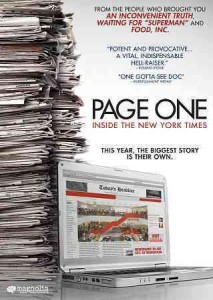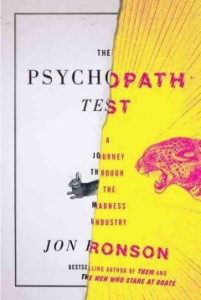Page One: Inside the New York Times
by Andrew Rossi
[DVD]

view/request
Andrew Rossi’s film Page One explores the role of print media in a rapidly changing technological landscape. The documentary goes inside the Eighth Avenue tower and we watch events unfold and become shaped into articles that eventually get delivered to our doorsteps.
The Internet has redirected the way in which many people seek information and this proves to be a financial threat to the survival of every newspaper. When Julian Assange’s initial YouTube barrage is dropped on the heads of the public, the Times writers not only have to think how to cover the event, they also need to ponder how it affects journalism on the whole. The WikiLeaks organization may upload footage, reach millions of people in a matter or moments and have little accountability in how they present their broadcast. The Times realizes that though they must follow the guidelines of responsible reporting, they still need to compete with this brand of information giving on some level.
Staff members are also profiled and followed around through the course of pitching and working on articles. We go inside meetings and presentations, too. David Carr, arguably the star of this film, is seen laying down the law in a meeting with Vice personnel, seeing his elderly father and giving a presentation on technology and media. Carr and many of the staff on screen, discuss the role of technology and Twitter and other social media.
Though the advertising and subscriptions that power the New York Times are at all time lows, the paper continues to move forward. Page One documents this tense, transitional period and shows the organization working on the fly to stay in the business.
Reviewed by Jason
Tagged: Documentary, Journalism, Technology
The Psychopath Test
by Jon Ronson
[Book]

view/request
The popular fictional sleuth Sherlock Holmes once stated,“when you have eliminated the impossible, whatever remains, however improbable, must be the truth.”
The Psychopath Test, a work of non-fiction, begins as a real life mystery to discover the meaning and motivation behind selected mailings of a strange bound book entitled Being or Nothingness (notewe are not referring to Sartre’sBeing and Nothingness). Jon Ronson, a journalist and the author of the highly successful novel the Men Who Stare at Goats, is enlisted to find the source and make some sense of the text.
Many aspects of the authors life begin to arrive at certain parallels as the quest progresses and further mysteries unfurl themselves. He finds himself in conversation with members of the church of Scientology (who hold a strong opposition to the field of psychiatry) which leads to an interview with a particular inmate at the Broadmoor Asylum who claims he has faked madness as an escape a lengthy jail sentence.
Ronson becomes intrigued with the concept of psychopathy and learns that there is a specific test that helps experts determine whether any individual has psychopathic tendencies.It should be noted that overall, these studies claim to reveal that 1 out of every 100 people happen to be psychopaths (you’re now cataloging and making a mental list of all the people you know, aren’t you?). He later applies the test to an infamously ruthless CEO after learning studies show that 4 out of every 100 big business, corporate leaders happen to be psychopaths. This interview with the man possessing a menagerie of predatorial creature artwork offers plenty of laughs. You may have heard an excerpt from this humorous section of the book and also the Broadmoor story on NPR’s This American Life.The Psychopath Test eventually extends from Ronson’s personal adventure to discuss the history of experimental treatments for troubled individuals, the present state of the psychiatric and mental health fields and also pharmaceutical industry. While Ronson carefully exhibits little or no bias on these aforementioned subjects, he skillfully presents issues at hand. Though his journey leads him to come face to face with serious and thought provoking dilemmas, Ronson is able find humor in certain situations and always keeps the reader entertained. At one stage the author writes, “I was writing a book about the madness industry and only just realizing that I was part of the industry.”
Reviewed by Jason
Tagged: Journalism, Mental health, Non-fiction, Psychopathy, Science


